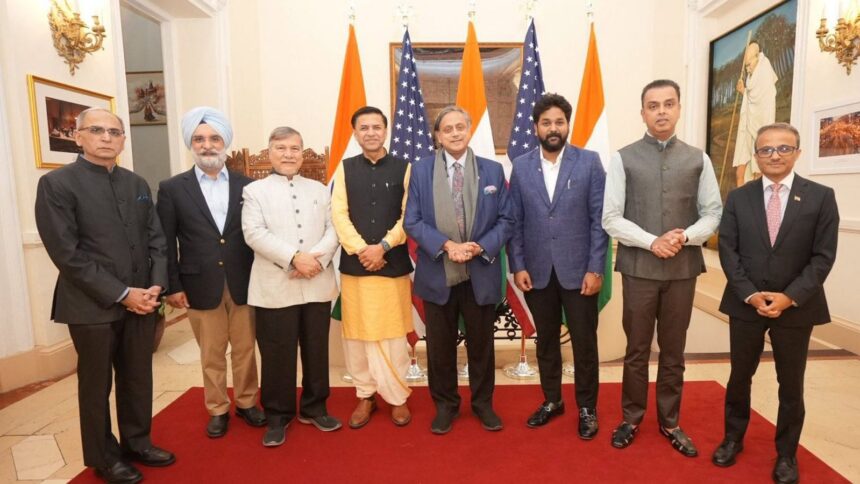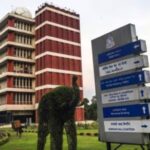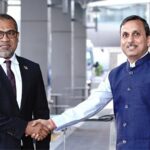The leader of an all-party team sent to rally support for India’s war against terror emanating from Pakistan said in New York Sunday that “no one sitting in Pakistan is going to be allowed to believe that they can just walk across the border and kill our citizens with impunity” and “there will be a price to pay” for such acts.
Underlining the need for “a new normal”, Congress MP made these remarks at an interaction, hosted by the Consulate General of India in New York, with members of the Indian-American community and individuals from leading media and think tanks.
Tharoor reached the US with an all-party delegation comprising Sarfaraz Ahmad (JMM), Ganti Harish Madhur Balayogi (TDP), Shashank Mani Tripathi (), Bhubaneswar Kalita (BJP), Milind Deora (), Tejasvi Surya (BJP) and India’s former Ambassador to the US Taranjit Singh Sandhu.
Describing the recent hostilities with Pakistan as an “88-hour war”, Tharoor said India looks at it with “frustration” because it needn’t have happened at all. “At the same time, we look back at this experience with a steely and renewed sense of determination. There has now got to be a new normal. No one sitting in Pakistan is going to be allowed to believe that they can just walk across the border and kill our citizens with impunity. There will be a price to pay and that price has been going up systematically.”
“In January 2016, there was an attack on an air base in a place called Pathankot. And our PM had just made a goodwill visit to Pakistan the previous month. He had attended the birthday celebration of … When this (Pathankot) happened, he was so astonished that he called the Pakistani PM and said ‘why don’t you (Pakistan) join the investigation and let’s solve who is doing this’.”
“You can imagine the horror of the Indian military establishment at this idea – that Pakistani investigators were going to come to an Indian air base. But they came. They went back and said the Indians did it to themselves. That was the last straw,” he said.
Tharoor also spoke about the &; and how was found on Pakistani soil in a Pakistani cantonment town.
“2016 was the last opportunity for them (Pakistan) to behave, to show they were serious about ending terror as they claimed… In September that year, there was another attack in a place called Uri… This time, India breached the LoC which it had rigorously observed throughout. We had never crossed it, but we crossed it with a surgical strike in September 2016. That seemed to have calmed things a bit, but unfortunately in the February of 2019, there was another terror attack in Pulwama, killing 40 Indians. Then, India responded… striking a known terror training camp in ,” he said.
“Now, we have not just crossed the LoC, we have also crossed the International Border. We have hit Pakistan in the heartland. We have done so only to send a message about terror. We are not interested in warfare with Pakistan. We would much rather be left alone… We have no desire to have anything that Pakistan has. Sadly, we may be a status quo power, they are not. They are a revisionist power. They covet territory that India controls and they want to have it at any price. And if they can’t get it through conventional means, they are willing to get it through terrorism. That is not acceptable to us,” he said.
Tharoor, who also heads the Parliamentary Standing Committee on External Affairs, said “we are determined now that there has to be a new bottom line to this”.
“We have tried everything: international dossiers, complaints to the sanctions committee, diplomacy, even this joint investigation attempt (Pathankot). Pakistan has remained in denial. There has been absolutely no conviction, no serious criminal prosecution, no attempt to dismantle the terror infrastructure in that country and the persistence of safe havens. From our point of view, this is it. You do this, you are going to get this back.”
“We have demonstrated with this operation (Operation Sindoor) that we can do it with a degree of precision and restraint that the world, we hope, will understand. We have a right to self-defence and we have exercised it. We have not done so irresponsibly,” he said.
Tourism in J&K, he said, was on the rise before the April 22 Pahalgam attack. “We were seeing peace and increasing prosperity… The kind of normalcy, growth and prosperity the people of Kashmir were enjoying as Indians and foreigners were flocking there. Some people decided to attack that process of normalisation.”
“India, sadly, had no reason to doubt where it came from. In one hour of the atrocity, a group called The Resistance Front had claimed credit, which was known for some years to be a frontal organisation of the banned, proscribed Lashkar-e-Taiba which is on the US-designated terrorist list as well.”
“The culpability lay not just with the four or five evil killers who came to Pahalgam and did this atrocity. But also with those who sent them, financed them, and trained and guided them into doing this since we knew where the LeT is headquartered. It is not just a safe haven but a rather generous 200-acre campus in a city in the heartland of Pakistani Punjab. We also knew where the responsibility lay. Sadly, Pakistan chose to follow its usual path of denial. In fact, with the help of China, Pakistan succeeded in removing a reference to The Resistance Front from the statement of condemnation drafted in the Security Council,” he said.
Tharoor said that after the attack, he authored an op-ed in , saying “”. “And I am pleased to say that is exactly what India did.”
From New York, the Indian delegation will head to four other countries – Guyana, Panama, Brazil and Colombia – before returning to Washington on June 3.
During his time in Uttar Pradesh, he covered politics, crime, health, and human rights among other issues. He did extensive ground reports and covered the protests against the new citizenship law during which many were killed in the state.
During the Covid pandemic, he did extensive ground reporting on the migration of workers from the metropolitan cities to villages in Uttar Pradesh. He has also covered some landmark litigations, including the Babri Masjid-Ram temple case and the ongoing Gyanvapi-Kashi Vishwanath temple dispute.
Prior to that, he worked on The Indian Express national desk for three years where he was a copy editor.
Rehman studied at La Martiniere, Lucknow and then went on to do a bachelor’s degree in History from Ramjas College, Delhi University. He also has a Masters degree from the AJK Mass Communication Research Centre, Jamia Millia Islamia.








